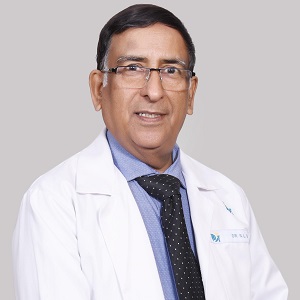Best Doctors in India for Alcoholic Hepatitis Treatment
- Senior Consultant - Hepatology and Liver Transplant, Mumbai, India
- Over 13 years’ experience
Profile Highlights:
- Dr. Uday Sanglodkar is a highly motivated and compassionate medical gastroenterologist with experience in hepatology/transplant hepatology.
- Dr. Uday Sanglodkar has vast experience in pre and post-liver transplant care, liver intensive care management, and evidence-based management of gastrointestinal and liver diseases.
- Dr. Sanglodkar is also an expert at diagnostic and therapeutic gastrointestinal endoscopy.
- Liver Transplant Surgeon, New Delhi, India
- Over 30 years’ experience
Profile Highlights:
- Dr. Sanjiv Saigal is a trained Hepatologist who has spearheaded the medical team of liver transplantation in the largest liver transplant program in India for over a decade
- Dr. Saigal is a bright name in the field of Gastroenterology and a famous liver transplant specialist with over 3400 successful Liver Transplants in his career.
- Medical Gastroenterologist, New Delhi, India
- Over 54 years’ experience
Profile Highlights:
- Dr. Sohan Lal Broor is a Gastroenterologist and has an experience of 54 years in this field. Dr. Broor practices at Indraprastha Apollo Hospitals in New Delhi.
- He completed MBBS from Panjab University in 1967, MD – Medicine from PGIMER, Chandigarh in 1972, and DM – Gastroenterology from PGIMER, Chandigarh in 1974.
- Dr. Sohan Lal Broor is a member of the 2-Year Fellowship in Gastroenterology at Medical College Of Wisconsin, Milwaukee, USA.
- Some of the services provided by Dr. Broor are Irritable Bowel Syndrome ( IBS ) Treatment, Peptic/ Gastric Ulcer Treatment, Inflammatory Bowel Disease (IBD) Treatment, Hemorrhoids Treatment, and Gastritis Treatment.
- Bariatric Surgeon, Chennai, India
- Over 25 years’ experience
Profile Highlights:
- Dr. Rajkumar Palaniappan is an acclaimed laparoscopic & minimal access obesity surgeon from India.
- His specialization in Bariatric Surgery led to success in carrying out over 400 procedures.
- Dr. Palaniappan also gained credit for performing India’s first Single Incision Laparoscopic Surgery (SILS) and Robotic Surgery.
- Dr. Palaniappan with his team invented the “Dundee Multitool” for Manual Laparoscopic Surgery. He is one of the few surgeons to execute Laparoscopic Whipple’s Pancreatic Duodenectomy.
- Orthopedic Surgeon, Chennai, India
- Over 21 years’ experience
Profile Highlights:
- Dr. A Navaladi Shankar is a well-known spine surgeon and orthopedist in Chennai with 21+ years of experience.
- He completed an MBBS from Al-Ameen Medical College, MNAMS from the National Board of Education, and a Diploma from Sri Ramachandra Medical College and Research Institute.
- Dr. Shankar holds expertise in Laminectomy, Lower Back Pain and Neck Pain Treatment, Arthritis Management, and Trauma Surgery.
- Urologist, Chennai, India
- Over 15 years’ experience
Profile Highlights:
- Dr. Deepak Raghavan is a renowned urologist who has gained immense fame and praise in the few years of his career.
- He is specially trained in Robotic Surgery, the need of the hour for Urology patients.
- Orthopaedic Surgeon, Chennai, India
- Over 22 years’ experience
Profile Highlights:
- Dr. Kornad P Kosygan is one of the few Orthopedic surgeons in India with a double FRCS degree.
- He has been successful in the diagnosis and treatment of severe Orthopedic problems throughout his career.
- Dr. Kornad is invited as an exclusive Orthopedics Specialist from over six countries in the Asian and European subcontinent.
- Dr. Kosygan has sought extensive training and exposure in the department of Orthopaedics.
- Orthopaedic Surgeon, Chennai, India
- Over 25 years’ experience
Profile Highlights:
- Dr. Madan Mohan Reddy is one of the most acclaimed Orthopedic Surgeons in India with tons of experience and knowledge that he gained over the course of years.
- He has attended several courses across the world, in countries like Switzerland, Germany, Australia, and Italy.
- Cardiothoracic Surgeon, Chennai, India
- Over 25 years’ experience
Profile Highlights:
- Dr. T Sundar is one of the best cardiothoracic surgeons in India.
- He is having extensive exposure to critical heart diseases and he has operated on them successfully.
- Dr. T Sundar is a Senior Consultant at Apollo Hospitals since 2003.
- He has been associated with international standards of surgery and diagnosis since his education period.
- Pediatric Urologist, Chennai, India
- Over 25 years’ experience
Profile Highlights:
- Dr. Sripathi is a renowned surgeon with 25 years of experience in the field of Pediatric Urology.
- Dr. V Sripathi qualified for the award of the “Fellowship of the Royal Australasian College of Surgeons” (FRACS) after working in Perth and Melbourne, Australia.
- He completed his Pediatric Urology training with a brief stint at the King Faisal Specialist Hospital & Research Center in Riyadh, specializing in advanced Reconstructive Urology.
Best Hospitals in India for Alcoholic Hepatitis Treatment
ALCOHOLIC HEPATITIS
Alcoholic hepatitis is a liver infection, which is mainly caused by frequent, heavy use of alcohol. Fat can build up in the liver cells, which might lead to inflammation as well as scarring of the liver.
Alcoholic hepatitis might be mild or severe. A patient might even need a liver transplant if proper treatment is not provided, or if they don’t stop consumption of alcohol.
It is also notable that all heavy drinkers don’t develop this condition, and sometimes this condition even develops in people who drink moderately. However, if you are diagnosed with this condition, it is important for you to quit drinking alcohol. People who continue drinking alcohol might face a huge risk of serious liver damage as well as death.
Symptoms
Depending on the amount of damage to the liver, the symptoms can vary. If you are having a mild form of the disease, you might not even experience any symptoms at all. However, as the damage continues to grow, you might experience the following:
- Changes in appetite
- Dry mouth
- Weight loss
- Pain or swelling in the abdomen
- Jaundice, or yellowing of the skin or eyes
- Fever
- Nausea and vomiting
- Easy bleeding or bruising
- Changes in your mental state, including confusion
- Fatigue
The symptoms of this condition are similar to those caused by a few other health conditions. Therefore, if you develop any of these symptoms, it is best to get a proper diagnosis as well as begin treatment.
Causes & risk factors
Alcoholic hepatitis generally develops when the alcohol you drink causes damage to your liver. However, it is not clear why alcohol does this damages only to some heavy drinkers.
Few factors that are known to play a role in this condition include:
- The body’s process that breaks down alcohol produces some toxic chemicals
- These chemicals can trigger inflammation that can destroy the liver cells
- Thus, over time, scars replace healthy liver tissue, thus interfering with the function of the liver
- This irreversible scarring, which is also termed cirrhosis, is the final stage of alcoholic liver disease
If you have hepatitis C and continue to drink, even moderately, you are more likely to develop cirrhosis.
Some heavy drinkers are also malnourished because they don’t eat a proper balanced diet. Alcohol and its byproducts also prevent the body from absorbing nutrition properly. Lack of nutrition can contribute to liver cell damage.
Some other risk factors that can lead to this condition include:
- Your sex- Women are usually at a higher risk of developing alcoholic hepatitis since the way alcohol is processed in women is different.
- Binge drinking- Having over five drinks within two hours for men and four or more for women can increase the risk of alcoholic hepatitis.
- Obesity- Heavy drinkers who are overweight are also more likely to develop alcoholic hepatitis and to progress from that condition to cirrhosis.
- Race and ethnicity- Hispanic and Negroid people might be at higher risk of alcoholic hepatitis.
- Genetic factors- According to studies, there may be a genetic component in alcohol-induced liver disease. However, it is difficult to separate genetic and environmental factors.
Diagnosis
If you are showing symptoms of alcoholic hepatitis, your doctor will first inquire about your medical history and alcohol consumption. Next, he/she will perform a physical exam to see if you have an enlarged liver or spleen. They might also need a few more tests to confirm your diagnosis, such as:
- Complete blood count (CBC)
- Liver function test
- Ultrasound of the liver
- Abdominal CT scan
- Blood clotting tests
In some cases, a liver biopsy might also be needed to confirm the diagnosis of alcoholic hepatitis. A liver biopsy requires your doctor to remove a tissue sample from your liver, which is then tested in the lab. This method helps to show the severity and type of liver disease.
Treatment
Stopping alcohol consumption is the most important treatment for alcoholic hepatitis. There is no cure for this condition, but treatment can help in reducing or eliminating symptoms, or stopping its progression.
It is also important to note that scarring of the liver is permanent, but treatment can aim to restore as much function as possible.
Dietary changes
Medication
Liver transplant
The best hope of recovery is to be aware of the signs and symptoms as well as to reduce, manage, or if possible, completely stop consumption of alcohol.
Complications
Alcoholic hepatitis might lead to severe other complications such as:
- Enlarged veins (varices)- In this condition, blood that is unable to flow freely through the portal vein, can back up into other blood vessels in your esophagus or stomach.
- Hepatic encephalopathy- This condition can be caused by the buildup of toxins if your damaged liver is unable to remove all the toxins from your body. It involves confusion, drowsiness, and slurred speech.
- Ascites- Ascites is a condition in which the fluid that accumulates in the abdomen may get infected and thus, require treatment with antibiotics. Although this condition is not life-threatening, it can be a sign of advanced alcoholic hepatitis, or cirrhosis.
- Kidney failure- A damaged liver affects blood flow to the kidneys, thus resulting in kidney failure.
- Cirrhosis- The scarring of the liver might lead to liver failure.
Prevention
Alcoholic hepatitis might be prevented if you take the following steps:
- Drink alcohol in moderation, if at all- For healthy adults, moderate drinking means no more than one drink a day for women of all ages and men older than 65, and not over two drinks a day for men aged 65 and younger. However, if you prevent all alcohol, it is a certain way to prevent this condition.
- Check before mixing medications and alcohol- Ask your doctor if it’s safe to drink alcohol while you are taking medications. Consider reading the warning labels on over-the-counter medications as well. Don’t drink alcohol when you are taking medications that warn of complications when combined with alcohol.
- Protect yourself from hepatitis C- Hepatitis C is an infectious liver disease that is caused by a virus. If it is left untreated, it may lead to cirrhosis. If you are having hepatitis C and you consume alcohol, you’re generally more likely to develop cirrhosis than if you don’t drink.















